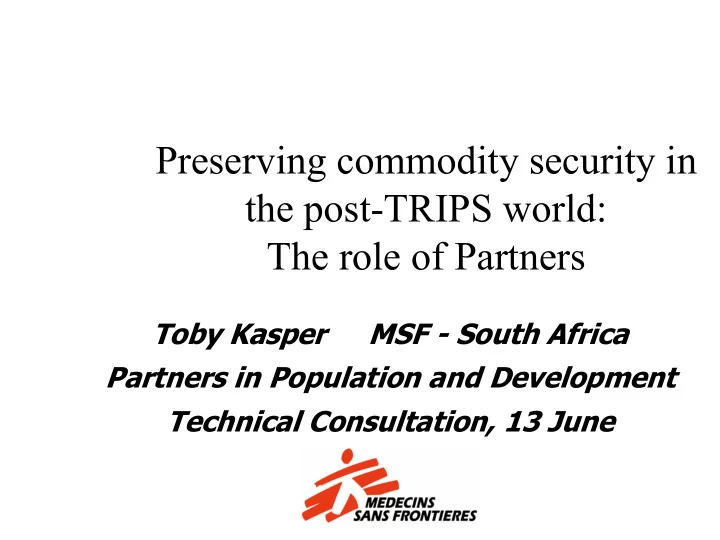

Preserving commodity security in the post-TRIPS world: The role of Partners Toby Kasper MSF - South Africa Partners in Population and Development Technical Consultation, 13 June
The context Why IPRs matter to Partners • Patients US$1 million = 900 800 Current SA prices: US$/patient/yr for ARV 700 600 1110 lives saved 500 Generics: 400 300 2857 lives saved 200 100 0 Patent (SA) Generic
The context Why IPRs matter to Partners • Commodity security/developmental • TRIPS = Income transfer from Southern consumers to Northern patent holders Self-reliance in the South as local industry is squeezed out
The context Why IPRs matter to Partners
The context From choice to conformity: WTO • WTO Agreement on Trade-Related Aspects of Intellectual Property Rights (TRIPS) – No discrimination between fields of technology � RH commodities treated same as CDs or hairdryers – 20 years of protection • Most developing countries had to be compliant by 2000
TRIPS and health Article 7 (Objectives) • The protection and enforcement of intellectual property rights should contribute to the promotion of technological innovation and to the transfer and dissemination of technology, to the mutual advantage of producers and users of technological knowledge and in a manner conducive to social and economic welfare, and to a balance of rights and obligations.
TRIPS and health Article 8.1 (Principles) • Members may, in formulating or amending their laws and regulations, adopt measures necessary to protect public health and nutrition, and to promote the public interest in sectors of vital importance to their socio- economic and technological development , provided that such measures are consistent with the provisions of this Agreement.
TRIPS and health Article 8.2 • Appropriate measures, provided that they are consistent with the provisions of this Agreement, may be needed to prevent the abuse of intellectual property rights by right holders or the resort to practices which unreasonably restrain trade or adversely affect the international transfer of technology.
Preserving RH commodity security in the post-TRIPS world • The role of Partners 1) Development and promotion of South- South agenda at international level 2) Implementation at national level
South-South collaboration • Problem : Multinational companies (frequently through US and EU) have dictated terms • Need : Strong, unified positions from developing countries: – Technical proposals at World Trade Organization – Focused advocacy at World Health Organization, World Intellectual Property Organization, and other UN bodies
South-South collaboration Exploiting TRIPS flexibility: WTO • Promote interpretations of TRIPS: – Supporting broad readings of Article 31 (compulsory licensing) and allowing fast-track compulsory licensing provisions – Allowing non-producer countries to benefit from compulsory licensing – Expanding scope of patent exemptions to cover health needs (Article 30) – Avoiding restrictive readings of country obligations for the protection of health registration data (Article 39)
South-South collaboration Exploiting TRIPS flexibility: WTO • Promote widespread adoption of parallel importation provisions and early working exceptions ( “ Bolar provisions ” ) • Insist on a lengthening of transition periods and on a moratorium on Dispute Settlement Understanding cases against developing countries until impact of TRIPS becomes clearer • Insist on fulfilment of obligation to transfer technology to least-developed countries (Article 66.2)
South-South collaboration Exploiting TRIPS flexibility: WHO/WIPO • Request that WHO and/or WIPO examine: – The costs and resources required to maintain a patent system for medicines, in terms of examining patents and litigating claims – The consequences of developing countries not having the capacity to avoid overly broad, non- novel, or anticompetitive patents
South-South collaboration Exploiting TRIPS flexibility: WHO/WIPO • Request that the WIPO prepare administrative models for examining patent validity and for compulsory licensing that will be workable in developing countries
Country-level initiatives • Legislation: – Withstand pressure to forego TRIPS safeguards – Implement safeguards – Utilise safeguards • Cooperation: – Ministries of Health/Welfare must articulate impact of IPR to Ministries of Trade
For more information • MSF Access Campaign website: – www.accessmed-msf.org • MSF International website: – www.msf.org • Toby Kasper (MSF-South Africa) – tobyk@mweb.co.za
Recommend
More recommend